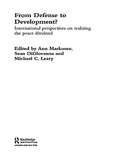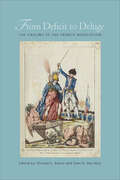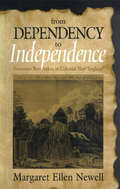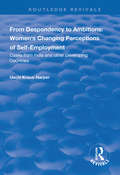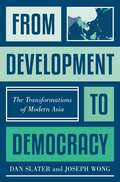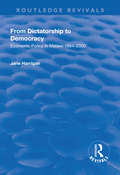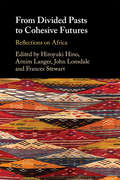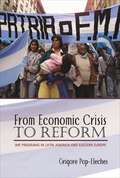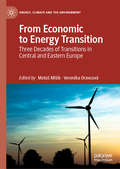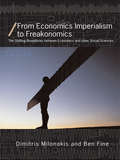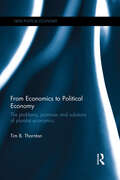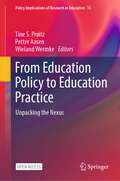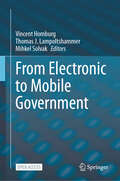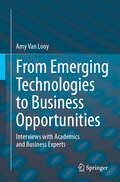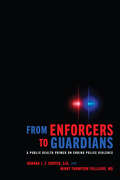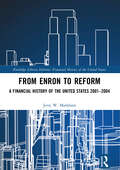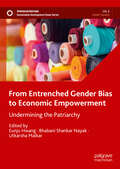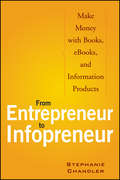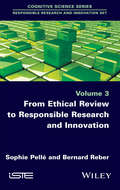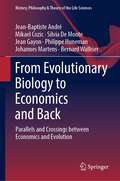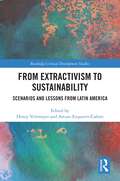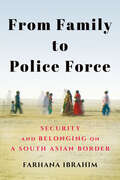- Table View
- List View
From Defense to Development?: International Perspectives on Realizing the Peace Dividend (Routledge Studies In Defence And Peace Economics Ser.)
by Sean M. DiGiovanna Ann MarkusenThis impressive book tracks the progress of twelve countries on five continents in moving resources from defense to civilian activity in the 1990's. Based on intensive field research, thanks to its truly international array of contributors, the book addresses each country with an impressive standard of scholarship. This accessible book is written i
From Deficit to Deluge: The Origins of the French Revolution
by Thomas E. Kaiser Dale K. Van KleyFrom Deficit to Deluge takes stock of shifts in scholarly investigation of the origins of French Revolution. During the last decade, scholars have moved beyond "revisionist" historians of the 1970s, who highlighted the monarchy's degeneration into despotism, to explore related conflicts in the realms of finance, social relations, religion, diplomacy, the Enlightenment, and colonial policy. In this book, seven established authorities explore some of these critical intersections, and together they make clear the role that unresolved tensions in these realms played in the essentially political narrative told by post-Marxian revisionist historiography. While each chapter of From Deficit to Deluge focuses upon one site of contention--fiscal, social, religious, diplomatic, ideological, and colonial--they all help to explain how long-standing structural problems of the Old Regime caused a fairly "normal" fiscal crisis to metastasize into a revolution. As the editors show in their introduction and conclusion, the growing democratization of politics sparked by the monarchy's clumsy efforts to solve the fiscal crisis put these wide-ranging problems at the epicenter of political debate, thereby sapping the foundations of royal authority and the social hierarchy.
From Dependency to Independence: Economic Revolution in Colonial New England
by Margaret Ellen NewellIn a sweeping synthesis of a crucial period of American history, From Dependency to Independence starts with the "problem" of New England's economic development. As a struggling outpost of a powerful commercial empire, colonial New England grappled with problems familiar to modern developing societies: a lack of capital and managerial skills, a nonexistent infrastructure, and a domestic economy that failed to meet the inhabitants' needs or to generate exports.Yet, less than a century and a half later, New England staged the war for political independence and the industrial revolution. How and why did this transformation occur Marshaling an enormous array of research data, Margaret Ellen Newell demonstrates that colonial New England's economic development and its leadership role in these two American revolutions were interrelated.
From Despondency to Ambitions: Cases from India and Other Developing Countries (Routledge Revivals)
by Uschi Kraus-HarperFirst published in 1998, this volume takes an international approach to women’s evolving perspectives on self-employment, with a particular focus on women in India. Author Uschi Kraus-Harper draws on ten years of research and interviews, visits and observations, gathering women’s stories from around the world. This book deeply explores women’s situations, empowerment, changing perceptions of enterprise, the effects of poverty and gender and what success really means. It is about poor women and their relation to self-employment. It is also about why change has come to some women and not to others.
From Development to Democracy: The Transformations of Modern Asia
by Dan Slater Joseph WongWhy some of Asia’s authoritarian regimes have democratized as they have grown richer—and why others haven’tOver the past century, Asia has been transformed by rapid economic growth, industrialization, and urbanization—a spectacular record of development that has turned one of the world’s poorest regions into one of its richest. Yet Asia’s record of democratization has been much more uneven, despite the global correlation between development and democracy. Why have some Asian countries become more democratic as they have grown richer, while others—most notably China—haven’t? In From Development to Democracy, Dan Slater and Joseph Wong offer a sweeping and original answer to this crucial question.Slater and Wong demonstrate that Asia defies the conventional expectation that authoritarian regimes concede democratization only as a last resort, during times of weakness. Instead, Asian dictators have pursued democratic reforms as a proactive strategy to revitalize their power from a position of strength. Of central importance is whether authoritarians are confident of victory and stability. In Japan, South Korea, and Taiwan these factors fostered democracy through strength, while democratic experiments in Indonesia, Thailand, and Myanmar were less successful and more reversible. At the same time, resistance to democratic reforms has proven intractable in Singapore, Malaysia, Hong Kong, China, Vietnam, and Cambodia. Reconsidering China’s 1989 crackdown, Slater and Wong argue that it was the action of a regime too weak to concede, not too strong to fail, and they explain why China can allow democracy without inviting instability.The result is a comprehensive regional history that offers important new insights about when and how democratic transitions happen—and what the future of Asia might be.
From Dictatorship to Democracy: Economic Policy in Malawi 1964-2000 (Routledge Revivals)
by Jane HarriganThis title was first published in 2001. Persuasive new research on the emergence of a new approach to structural adjustment programmes emerging in Malawi during the late 1990s. By focusing on the enabling role of the state and non-price structural reforms in the agricultural sector, the author presents valuable lessons for economic reforms in other Sub-Saharan countries.
From Divided Pasts to Cohesive Futures: Reflections on Africa
by Hiroyuki Hino John Lonsdale Frances Stewart Arnim LangerToday, the cohesion of multi-ethnic societies is at risk across the globe. Throughout history, to the present day, African countries have been facing this challenge. Historical inequalities and social division undermine cohesion and sow seeds of instability. How can Africa build a future where ethnic and other differences are a strength, a driver of growth and development, rather than sources of division and instability? Drawing together historians, economists and political scientists, each an authority on Africa, this book delivers a comprehensive study of that question through an exploration of the continent's divided histories, to understand where Africans stand now, and to reflect on how they might now work towards a more trusting society. Numerous case studies, statistical expositions and theoretical reflections bring conceptual clarity to the often poorly understood processes and contexts of social cohesion, not only in Africa, but across the developing and developed world.
From Dream to Reality: How to Make a Living as a Freelance Writer
by Jessie L. KwakWant to make a living as a freelance writer? Here are the resources, answers, and real talk you need about what it takes to make a living as a writer for hire. Drawing on her own varied and successful years of freelance copywriting experience, Jessie Kwak (author of From Chaos to Creativity and From Big Idea to Book) offers valuable insights on how to figure out if this fast-paced, ever-evolving career is for you—and how to make it work if you decide to go for it. Starting with the most important factor for a successful freelancer—mindset—Kwak walks you through everything you need to know about choosing your niche, setting up your business, building a portfolio and website, finding work, setting your rates, billing, firing clients, and growing your freelance career intentionally in a rapidly changing market. The book's special focus is on business writing for hire, with valuable lessons for writers of all stripes. Freelancing isn't for everyone, but if you're the sort of mercenary chaotic good soul who would find your happy place in freelancing, you'll find all the encouragement and tools you could need in this book.
From Economic Crisis to Reform: IMF Programs in Latin America and Eastern Europe
by Grigore Pop-ElechesThe wave of neoliberal economic reforms in the developing world since the 1980s has been regarded as the result of both severe economic crises and policy pressures from global financial institutions such as the International Monetary Fund (IMF). Using comparative evidence from the initiation and implementation of IMF programs in Latin America and Eastern Europe, From Economic Crisis to Reform shows that economic crises do not necessarily persuade governments to adopt IMF-style economic policies. Instead, ideology, interests, and institutions, at both the international and domestic levels, mediate responses to such crises. Grigore Pop-Eleches explains that the IMF's response to economic crises reflects the changing priorities of large IMF member countries. He argues that the IMF gives greater attention and favorable treatment to economic crises when they occur in economically or politically important countries. The book also shows how during the neoliberal consensus of the 1990s, economic crises triggered IMF-style reforms from governments across the ideological spectrum and how these reforms were broadly compatible with democratic politics. By contrast, during the Latin American debt crisis, the contentious politics of IMF programs reflected the ideological rivalries of the Cold War. Economic crises triggered ideologically divergent domestic policy responses and democracy was often at odds with economic adjustment. The author demonstrates that an economic crisis triggers neoliberal economic reforms only when the government and the IMF agree about the roots and severity of the crisis.
From Economic to Energy Transition: Three Decades of Transitions in Central and Eastern Europe (Energy, Climate and the Environment)
by Matúš Mišík Veronika OravcováThis book examines energy transition issues within the Central and Eastern European (CEE) region. The European Union is aiming for an almost complete decarbonization of its energy sector by 2050. However, the path towards a carbon-free economy is full of challenges that must be solved by individual EU members. Across 18 chapters, leading researchers explore challenges related to energy transition and analyse individual EU members from Central and Eastern Europe, as well as the region as a whole. To further explore this complex issue, the volume also includes several countries from South East Europe in its analysis. As perspective members, these countries will be important contributors to the EU’s mid- and long-term climate and energy goals. The focus on a variety of issues connected to energy transition and systematic analyses of the different CEE countries make it an ideal reference for anyone with a general interest in the region or European energy transition. It will also be a useful resource for students looking for an accessible overview of the field.
From Economics Imperialism to Freakonomics: The Shifting Boundaries between Economics and other Social Sciences (Economics as Social Theory)
by Ben Fine Dimitris MilonakisIs or has economics ever been the imperial social science? Could or should it ever be so? These are the central concerns of this book. It involves a critical reflection on the process of how economics became the way it is, in terms of a narrow and intolerant orthodoxy, that has, nonetheless, increasingly directed its attention to appropriating the subject matter of other social sciences through the process termed "economics imperialism". In other words, the book addresses the shifting boundaries between economics and the other social sciences as seen from the confines of the dismal science, with some reflection on the responses to the economic imperialists by other disciplines. Significantly, an old economics imperialism is identified of the "as if market" style most closely associated with Gary Becker, the public choice theory of Buchanan and Tullock and cliometrics. But this has given way to a more "revolutionary" form of economics imperialism associated with the information-theoretic economics of Akerlof and Stiglitz, and the new institutional economics of Coase, Wiliamson and North. Embracing one "new" field after another, economics imperialism reaches its most extreme version in the form of "freakonomics", the economic theory of everything on the basis of the most shallow principles. By way of contrast and as a guiding critical thread, a thorough review is offered of the appropriate principles underpinning political economy and its relationship to social science, and how these have been and continue to be deployed. The case is made for political economy with an interdisciplinary character, able to bridge the gap between economics and other social sciences, and draw upon and interrogate the nature of contemporary capitalism.
From Economics to Political Economy: The problems, promises and solutions of pluralist economics (New Political Economy)
by Tim B. ThorntonThe discipline of economics has been increasingly criticized for its inability to illuminate the workings of the real world and to provide reliable policy guidance for the major economic and social challenges of our time. A central problem in contemporary economics, and a problem from which many of its other failings flow, is its lack of plurality. By a lack of plurality it is meant that contemporary economics lacks diversity in its methods, theories, epistemology and methodology. It is also meant that economics has become far less interdisciplinary. From Economics to Political Economy offers an explanation as to why economics has become so determinedly non-pluralistic, and also gives considerable attention to exploring and evaluating promising strategies for reform. These strategies include developing a pluralist economics under the label of ‘political economy’ within other social science departments (such as departments of politics). Along the way the reader will learn about the worldwide student movement seeking greater pluralism in economics, encounter some dramatic case studies in intellectual suppression, gain a fuller sense of the nature of contemporary economics and explore the relationship between economics and other social sciences. This book is of interest to any social scientist, particularly those with interests in economics and politics.
From Education Policy to Education Practice: Unpacking the Nexus (Policy Implications of Research in Education #15)
by Tine S. Prøitz Wieland Wermke Petter AasenThis open access book addresses the complex interrelations between education policy and education practice developed under new ways of governance. It illuminates the nexuses of the interrelated fields of education policy and education practice including the characteristics of these relationships. The book offers a selection of cases with varied approaches to the question of how different actors and stakeholders are situated in contemporary policy and practice nexuses. The cases presented includes theoretical and conceptual studies; historical studies; ethnographic studies; and studies combining empirical interview data and quantitative data. The book shows what constitutes the contemporary nexuses in education and discusses the need to re-consider how we in education research approach policy and practice in the interface between structure and agency for the future developments in the education policy-practice nexus.
From Electronic to Mobile Government
by Vincent Homburg Thomas J. Lampoltshammer Mihkel SolvakThe open access book combines insights from policy sciences (backgrounds of cross-border coordination challenges), design science (development of architectures for mobile services), information ethics (privacy and security of e-government services in international arenas) and business studies (changes in existing business models). The notably interdisciplinary character provides scholars and policy professionals working in specific (legal, political, engineering) disciplines a unique outlook on how policy making, implementation, and pilots are related in multi-level and cross-border governance. The book presents the results of the EU-funded “Mobile Cross-Border Government Services for Europe” (mGov4EU) project in which various pilots implemented and validated enhanced infrastructure services for electronic voting, smart mobility, and mobile signing. Together, the single pilots demonstrated how enhanced electronic identities and trust services (eIDAS) and Single Digital Gateway Regulation (SDGR) layers can accommodate once-only, digital-by-default and mobile-first principles. By taking advantage of security features of modern smartphones like hardware-backed secure elements together with integrated convenience elements like biometric sensors, this research showed how both the security needs and data-protection expectations one has into public services and the usability challenges that arise when accessing complex services using constrained mobile devices meet. This book is the first one in his kind to address this gap in the academic knowledge, as well as this gap in available compendiums for policy professionals at European levels of decision-making, as well as for policymakers and experts working on electronic identification, cross-border and cross-sector information exchange in the various member states of the European Union. This way, it serves various audiences: first, researchers in informatics-related areas like information systems, electronic government, and mobile applications, as it describes empirical examples of secure, easy-to-use and cross-border electronic services that have been developed and successfully tested in practice. Second, it also caters to researchers in international relations or political science as well as policymakers and politicians, both at national or European levels, who are involved in drafting policies and implementing European initiatives in relation to the building blocks of next-generation e-government services.
From Emerging Technologies to Business Opportunities: Interviews with Academics and Business Experts
by Amy Van LooyThis book provides an up-to-date overview and critical discussion of technologies that shape and influence the digital economy, and especially covers artificial intelligence, Internet of Things, virtual and augmented reality, digital twins, blockchain technology, 3D printing, and biochip technology. After two introductory chapters about the digital economy and digital technologies in general, dedicated chapters explain the basics and foundations of each of the selected technologies as well as their potential for industry and services. To this end, these chapters first introduce the specific digital technology, followed by one interview with an academic expert for further describing and explaining the technology plus a second one with a business expert for illustrating a successful business case. Each chapter ends with a recap of the takeaways, supplemented by links to further readings for those who are eager to delve more into the relative topic as well as a self-test to challenge the reader’s understanding. The book mainly targets business professionals and advanced undergraduate students in business and computer science. Business professionals (ranging from employees to managers and executives) will become acquainted with the basic terminology and diverse business aspects related to emerging digital technologies. They will benefit from descriptions by academic leaders in the field along with information and advice from industry people. Students will get an overview of the most important technologies which may also help them in selecting the most promising topics in their further education.
From Empires to NGOs in the West African Sahel
by Gregory MannThis book looks beyond the familiar history of former empires and new nation-states to consider newly transnational communities of solidarity and aid, social science and activism. Shortly after independence from France in 1960, the people living along the Sahel - a long, thin stretch of land bordering the Sahara - became the subjects of human rights campaigns and humanitarian interventions. Just when its states were strongest and most ambitious, the postcolonial West African Sahel became fertile terrain for the production of novel forms of governmental rationality realized through NGOs. The roots of this "nongovernmentality" lay partly in Europe and North America, but it flowered, paradoxically, in the Sahel. This book is unique in that it questions not only how West African states exercised their new sovereignty but also how and why NGOs - ranging from CARE and Amnesty International to black internationalists - began to assume elements of sovereignty during a period in which it was so highly valued.
From Enforcers to Guardians: A Public Health Primer on Ending Police Violence
by Mindy Thompson Fullilove Hannah L. CooperA public health approach to understanding and eliminating excessive police violence.Excessive police violence and its disproportionate targeting of minority communities has existed in the United States since police forces first formed in the colonial period. A personal tragedy for its victims, for the people who love them, and for their broader communities, excessive police violence is also a profound violation of human and civil rights.Most public discourse about excessive police violence focuses, understandably, on the horrors of civilian deaths. In From Enforcers to Guardians, Hannah L. F. Cooper and Mindy Thompson Fullilove approach the issue from a radically different angle: as a public health problem. By using a public health framing, this book challenges readers to recognize that the suffering created by excessive police violence extends far outside of death to include sexual, psychological, neglectful, and nonfatal physical violence as well.Arguing that excessive police violence has been deliberately used to marginalize working-class and minority communities, Cooper and Fullilove describe what we know about the history, distribution, and health impacts of police violence, from slave patrols in colonial times to war on drugs policing in the present-day United States. Finally, the book surveys efforts, including Barack Obama's 2015 creation of the Task Force on 21st Century Policing, to eliminate police violence, and proposes a multisystem, multilevel strategy to end marginality and police violence and to achieve guardian policing. Aimed at anyone seeking to understand the causes and distributions of excessive police violence—and to develop interventions to end it—From Enforcers to Guardians frames excessive police violence so that it can be understood, researched, and taught about through a public health lens.
From Enron to Reform: A Financial History of the United States 2001–2004 (Financial History of the United States)
by Jerry W. MarkhamOriginally published in 2006, this book examines the collapse of the Enron Corp. and other financial scandals that arose in the wake of the market downturn in 2000. Part 1 reviews the market book and bust that preceded Enron’s collapse. It then describes the growth of Enron and the events that led to its sensational failure. Part 2 examines the role of the Securities and Exchange Commission’s full disclosure system in corporate governance and the role of accountants in that system. Part 3 reviews the meltdown in the telecoms sector and the accounting scandals that emerged. Part 4 traces the remarkable market recovery that followed the financial scandals and the resumption of the growth of finance in America.
From Entrenched Gender Bias to Economic Empowerment: Undermining the Patriarchy (Sustainable Development Goals Series)
by Bhabani Shankar Nayak Eunju Hwang Utkarsha MalkarThis book examines entrenched gender bias and the economic, political, and social systems that sustain patriarchy. Drawing examples from both developed and developing countries, it underscores the barriers women face within the capitalist system. It delves into how operational practices, economic frameworks, and political institutions perpetuate gender bias. Through the study of cases where traditional power structures have been challenged, it proposes a framework for achieving gender equality through cooperative and collaborative action, ensuring inclusion for all within the democratic system. This book places particular emphasis on the economic involvement of rural women, the potential for technology to empower women, gender equality within the creative industries, and the enduring nature of patriarchy. It demonstrates how economic progress can be inclusive and beneficial for women globally and will be of interest to students and researchers in development studies, labour economics, political economy, and gender studies.
From Entrepreneur to Infopreneur
by Stephanie ChandlerInfopreneurs sell valuable information online in the form of books, e-books, special reports, audio and video products, seminars, and other media. This definitive guide will show how to master the tools and tactics of the most successful infopreneurs, so you can succeed at producing, marketing, selling, and automating delivery of information products online. This guide comes complete with interviews of successful infopreneurs.
From Ethical Review to Responsible Research and Innovation
by Bernard Reber Sophie PelléThe concept of RRI has emerged as a new framework to be used by the European Commission for research projects. It now lies at the core of the Horizon 2020 programme and is designed to replace current assessment practices focused on ethical review. The book will analyse the shift from ethical review to RRI: what remains of the former, what has been gained? Secondly, it makes a critical presentation of existing ethical reviews from the perspectives of moral philosophy and the philosophy of technology. It discusses conceptions of ethical assessment on different levels. Thirdly, this book presents the RRI pillars presented by the European commission, together with their possible relationships to different governance models. Moreover, existing academic literature on RRI, which is not yet extensive, is growing rapidly. Various frameworks highlighting the dimensions of and conditions for responsible research and innovation have been proposed to define RRI. However, in spite of a well-established tradition on the subject in moral theory and philosophy, none of these approaches has investigated the concept of responsibility in depth. Fourthly, and for this reason, the book will provide an analysis of various meanings of responsibility that have been identified in moral theory and will discuss their relevance for RRI in different contexts. It will defend a pluralist approach to responsibility and explore several combinations of responsibilities depending on how these responsibilities are shared in a given context. The book adopts both a theoretical and a practical approach by assessing different participatory devices and analysing a number of research cases.
From Evolutionary Biology to Economics and Back: Parallels and Crossings between Economics and Evolution (History, Philosophy and Theory of the Life Sciences #28)
by Philippe Huneman Jean Gayon Bernard Walliser Mikael Cozic Jean-Baptiste André Silvia De Monte Johannes MartensThis book offers a comprehensive exploration of the major key concepts common to economics and evolutionary biology. Written by a group of philosophers of science, biologists and economists, it proposes analyses of the meaning of twenty-five concepts from the viewpoint respectively of economics and of evolutionary biology –each followed by a short synthesis emphasizing major discrepancies and commonalities. This analysis is surrounded by chapters exploring the nature of the analogy that connects evolution and economics, and chapters that summarize the major teachings of the analyses of the keywords. Most scholars in biology and in economics know that their science has something in common with the other one, for instance the notions of competition and resources. Textbooks regularly acknowledge that the two fields share some history – Darwin borrowing from Malthus the insistence on scarcity of resources, and then behavioral ecologists adapting and transforming game theory into evolutionary game theory in the 1980s, while Friedman famously alluded to a Darwinian process yielding the extant firms. However, the real extent of the similarities, the reasons why they are so close, and the limits and even the nature of the analogy connecting economics and biological evolution, remain inexplicit. This book proposes basis analyses that can sustain such explication. It is intended for researchers, grad students and master students in evolutionary and in economics, as well as in philosophy of science.
From Expert Student to Novice Professional
by Anna Reid Peter Petocz Madeleine Abrandt Dahlgren Lars Owe DahlgrenStudents entering higher education expect their studies to lead them towards some specific form of professional career. But in this age, complex internationalized professions are the main source of work for graduates, so students need to prepare themselves for a future that can be volatile, changeable and challenging. This book shows how students navigate their way through learning and become effective students; it details how to shift the focus of their learning away from the formalism associated with the university situation towards the exigencies of working life. It is in this sense that the book explores how people move from being expert students to novice professionals. This book presents a model of professional learning fashioned out of a decade of research undertaken in countries half a world away from each other--Sweden and Australia. It uses empirical research gathered from students and teachers to show how students negotiate the forms of professional knowledge they encounter as part of their studies and how they integrate their understandings of a future professional world with professional knowledge and learning. It reveals that as students move from seeing themselves as learners, they take on more of a novice professional identity which in turn provides a stronger motivation for their formal studies.
From Extractivism to Sustainability: Scenarios and Lessons from Latin America (Routledge Critical Development Studies)
by Henry Veltmeyer Arturo Ezquerro-CañeteThis book investigates how extractive capitalism has developed over the past three decades, what dynamics of resistance have been deployed to combat it, and whether extractivism can ever be transformed into being a part of a progressive development path. It was not until the 20th century that the extraction of natural resources and raw materials took on a decidedly capitalist form, with the global north extracting primary commodities from the global south as a means of capital accumulation. This book investigates whether extractivism, despite its well-documented negative and destructive socioenvironmental impacts and the powerful forces of resistance that it has generated, could ever be transformed into a sustainable post-development strategy. Drawing on diverse sectoral forms of extractivism (mining, fossil fuels, agriculture), this book analyses the dynamics of both the forces of resistance generated by the advance of extractive capital and alternate scenarios for a more sustainable and liveable future. The book draws particularly on the Latin American experience, where both the propensity of capitalism towards crisis and the development of resistance dynamics to ‘extractive’ capital have had their greatest impact in the neoliberal era. This book will be of interest to researchers and students across development studies, economics, political economy, environmental studies, Indigenous studies, and Latin American affairs.
From Family to Police Force: Security and Belonging on a South Asian Border (Police/Worlds: Studies in Security, Crime, and Governance)
by Farhana IbrahimFrom Family to Police Force illuminates the production and contestation of social, familial, and national order on a South Asian borderland. In the borderland that divides Kutch, a district in the western Indian state of Gujarat, from Sindh, a southern province in Pakistan, there are many forces at work: civil and border police, the air wing of the armed forces, paramilitary forces, and various intelligence agencies that depute officers to the region. These groups are the major actors in the field of security and policing. Farhana Ibrahim offers a bird's-eye view of these groups, drawing on long-standing anthropological engagement with the region. She observes policing on multiple levels, showing in detail that the nation-state is only one of the scales at which policing is enacted at a borderland. Ibrahim draws on multiple sources and forms of policing structure to illuminate everyday interaction on the personal scale, bringing families and individuals into the broader picture. From Family to Police Force looks beyond the obvious sites, sources, and modes of policing to show the distinctions between the act of policing and the institution of the police.
